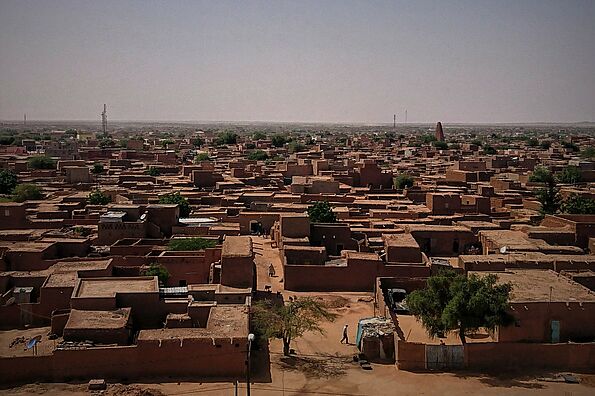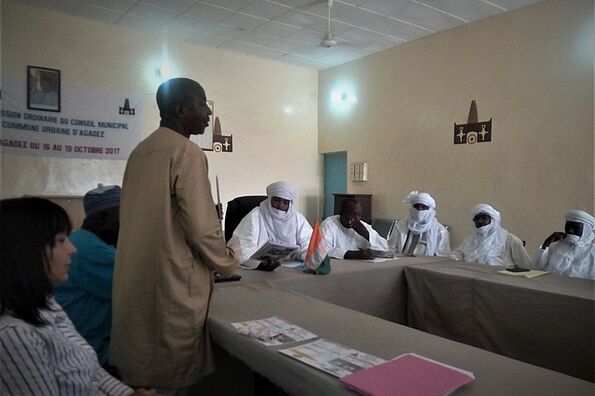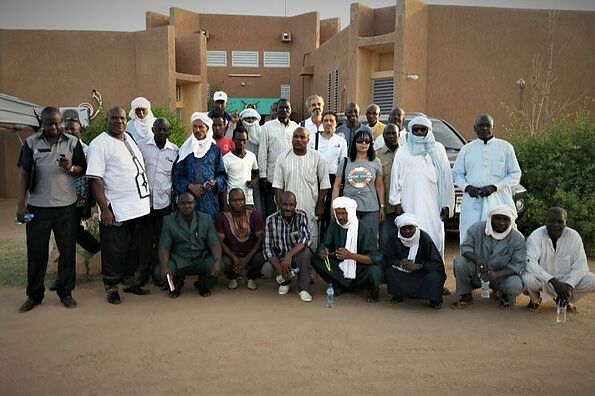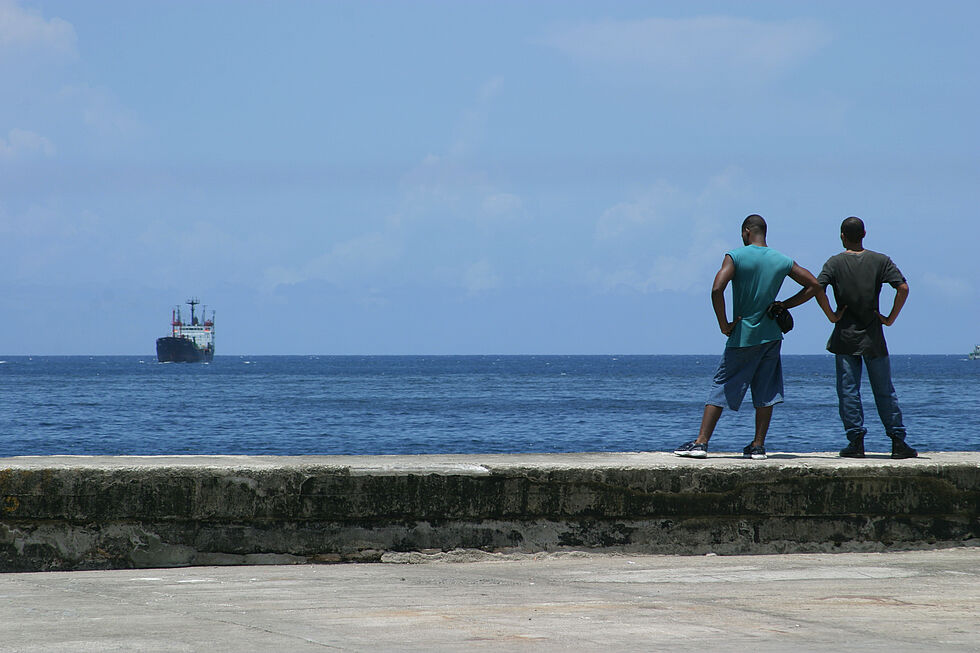More unity and solidarity: Two things we need for migration governance in Africa
Migration is primarily internal to the African continent, where intra-regional migration amounts to 80 per cent of total migration flows from African countries, says Sami Adouani, since 2017 in charge of PROMIG-FES, a new four-year regional project on migration governance by the office of Friedrich-Ebert-Stiftung (FES) in Tunisia.
We spoke to Sami about the situation with migration in Africa and the next steps towards progressive migration governance looking at the experiences from the recent mission to Niger with trade unions as part of the new regional project.
What is the current situation with migration in Africa and the main challenges that migrants face?
Sami Adouani: Intra-regional migration amounts to 80 per cent of total migration flows from African countries. West Africa is the main region of destination, with 8 million migrants, almost all of whom find themselves in informal employment arrangements, discriminated against on account of their origin and also their exclusion from trade unions. As up to 90 per cent of the jobs in the region are in the informal economy (link in English), it is impossible to dissociate the situation of migrant workers from the one faced by the local population.
Although sovereign states are under no obligation to receive migrants, the right to freedom of movement and circulation is enshrined in the Universal Declaration of Human Rights. Policies targeted at curbing irregular migration flows have led to a vicious cycle of violence and human rights abuses. One disturbing example is the video and photo images from a migrants’ auction sale in Libya, just outside of Tripoli, circulated in November [link in English].
"In the case of Algeria, migrant workers are unloaded in work clothes on the Nigerian borders without identity papers, making the task of the relevant organizations even more difficult"
Crossing borders, migrants are confronted with abuse, organized smugglers and traffickers, as well as corrupt agents for whom extortion and racketeering of migrants has become a source of income. Left without money and belongings, migrants turn to sex work, or are reduced to begging for food for work to be able to carry on their journey to the host land.
Examples abound of the contradictions behind the decision by European states who, in fighting and criminalizing irregular migration, have succeeded in creating the illusion that they are protecting their local population, concealing in the process the failures of their social and economic reforms.
For those who manage to reach their destination, there is the risk of military expulsions, arrests at their work places and immediate exile without the chance to recuperate their personal belongings. In the case of Algeria, migrant workers are unloaded in work clothes on the Nigerian borders without identity papers, making the task of the relevant organizations even more difficult.
For those who survive the journey, their irregular situation exposes them to criminal organizations and to the greed of business owners looking for cheap labour. Cases of forced work have been identified in Europe, mainly in the agricultural regions of Italy and Spain.
These are but a few examples of the contradictions behind the decision by European states who, in fighting and criminalizing irregular migration, have succeeded in creating the illusion that they are protecting their local population, concealing in the process the failures of their social and economic reforms.
Is the project PROMIG-FES trying to address these failures? How did the project come to be?
Before the project was introduced, I was responsible for trade union cooperation at the FES office in Tunisia for almost a decade. In that context, FES Tunisia partnered with the Tunisian Trade Union Federation (UGTT) to address the transformation of Maghreb countries into countries of destination. In 2014, the activities that were part of that project led to the setting up of an international network of trade unions, the Réseau Syndical Migrations Subsahariennes Méditerranéennes (RSMMS) known also in English as Trade Union Network on Mediterranean and Sub Saharan Migration.
RSMMS operates as a regional platform and includes organizations from West Africa, Maghreb and Europe, all of them intent on consolidating their efforts to address the race to the bottom in the working conditions of migrant workers, the violation of their fundamental rights and migration-related international conventions and instruments.
Today, the network counts 21 trade unions from Southern Europe, Northern Africa and Sub-Saharan Africa, with all three regions equally represented. Linking the different realities of people in the regions is a rewarding exercise, which in my view rests at the centre of international solidarity.
The PROMIG-FES project together with its partners International Trade Union Confederation (ITUC) Africa and Organization of Trade Unions of West Africa (OTUWA) supported a mission by RSMMS to Agadez, Niger. What was the objective?
SA: PROMIG-FES funded this activity, although the participation of European representatives was supported by their respective organizations. As part of PROMIG-FES, we set up an international delegation of unions that, in collaboration with ITUC Africa and the regional organization OTUWA, conducted a mission on the ground, in the city of Agadez. Agadez is known in Africa for its migration routes that lead towards Libya and Algeria. The delegation had as a mission to meet migrants and to support the actions of our Nigerian member, the largest trade union center in Niger, the Union of Workers’ Trade Union of Niger (USTN).
What role did FES and the PROMIG-project of FES Tunisia assume during the mission, how were the trade unions involved and what were the main take-aways of the mission?
SA: It was the first time such a delegation visited Agadez and we are proud to have contributed to helping frame the analysis around the migration flows and the role of the unions in addressing the challenges of this major issue. This mission has also allowed FES to sign its first activity in Niger, a capacity-building session organized in the country’s capital Niamey for the regional union representatives of USTN.
Our discussions with former migrant smugglers emphasized the absence of durable alternative solutions and the contradictions of the development aid policies. The lavish equipment of the police and military forces are not addressing the core issues of the African countries, nor are they stopping migration flows.
In Agadez the level of complexity of the current situation is very visible. The city represents the symbol of confrontation between the European States policies and the social and economic reality of the Sub-Saharan countries. The economy of Agadez, a city in the heart of the desert, was historically connected to the transit of travellers and goods. After the collapse of the tourism business on the back of increasing security issues, a number of people have made their living from the migrants (transportation, trading, food etc.). Since a 2015 law criminalizing those activities, people were left without any alternative source of income, increasing economic instability and tensions among the population.
Our discussions with former migrant smugglers emphasized the absence of durable alternative solutions and the contradictions of the development aid policies. The lavish equipment of the police and military forces are not addressing the core issues of the African countries, nor are they stopping migration flows. The 2015 law was instrumental in increasing tremendously the fees paid to smugglers and rendered the roads even more dangerous.
The criminalization of migration features prominently as a topic within policy debates to address migration. Countries including Niger have toughened policies to halt migration. Niger followed suit despite the fact that the country is part of the Economic Community of West African States (ECOWAS). What do the measures try to achieve, how would you assess them?
SA: In a press release the delegation to Agadez stated that “under pressure of the European Union and some of its members, some African countries, such as Niger, have tightened up their policies to curb irregular migration. This runs counter to the ECOWAS agreements on regional mobility.” This portrays clearly the interference between the policies of the different regions.
Today, European countries are questioning the free circulation of people whilst already agreed on among the ECOWAS countries. This pressure was made possible by opportunistic African governments but more importantly because of the weaknesses of the States of the region that rely on international aid and who had no choice but to tolerate its conditions.
Far from denying the security challenges surrounding the migration flows today or the urgent need to address the European public opinion concerns, we are just highlighting that the current measures are not adequate in countries suffering from long standing development gaps and governance deficits. Europe, driven by fear, has stopped carrying the human rights flag exposing its southern region to further destabilization.
We are hoping that the current challenges call for more unity among Africa. In this context, we are supporting an ITUC Africa mission, this time in Abuja, whose purpose will be to push for a rights-based approach to migration and labour migration governance.
Against the background of the main findings of the mission to Agadez, what are, in your eyes, the next steps that need to be tackled? Do you think the upcoming EU-AU Summit in November might provide a suitable forum to discuss migration in Africa?
SA: Migration issues cannot be addressed by states in an isolated way. This points to the measures that the next EU-Africa Union Summit could come up with. We have the obligation to build a different governance system where the unions and civil society play a key role.
We cannot continue blaming irregular migration while creating a system that increases irregularity. We cannot afford to let countries fall into xenophobia and racism because of their futile political agendas. We cannot carry on supporting corrupt systems just because they serve these agendas. We cannot afford to continue believing in the fantasy of closed borders.
We are at a critical juncture that should call for a renewal of the concept of international solidarity. This requires courageous programmes in favour of legal migration protecting human rights and ensuring the safety of the migrant populations. Actually, this is no more more ambitious than what is already written in the Rabat process and Valetta plan of action, and it is the PROMIG-FES priority. ###
For more information on the project, contact Sami Adouani and the FES Tunisia office at www.festunis.org.
About FES Connect
Connecting people, in the spirit of social democracy, we source and share content in English from the German and international network of the Friedrich-Ebert-Stiftung.













